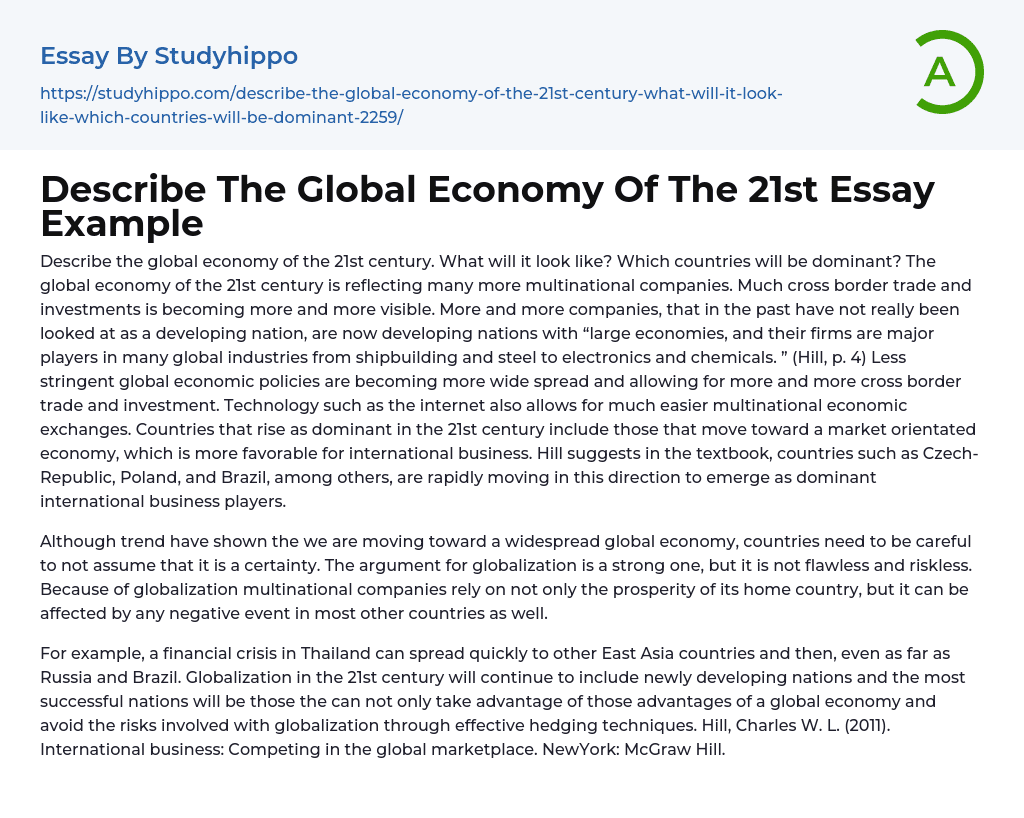Describe the global economy of the 21st century. What will it look like? Which countries will be dominant? The global economy of the 21st century is reflecting many more multinational companies. Much cross border trade and investments is becoming more and more visible. More and more companies, that in the past have not really been looked at as a developing nation, are now developing nations with “large economies, and their firms are major players in many global industries from shipbuilding and steel to electronics and chemicals. ” (Hill, p. 4) Less stringent global economic policies are becoming more wide spread and allowing for more and more cross border trade and investment. Technology such as the internet also allows for much easier multinational economic exchanges. Countries that rise as dominant in the 21st century include those that move towar
...d a market orientated economy, which is more favorable for international business. Hill suggests in the textbook, countries such as Czech-Republic, Poland, and Brazil, among others, are rapidly moving in this direction to emerge as dominant international business players.
Although trend have shown the we are moving toward a widespread global economy, countries need to be careful to not assume that it is a certainty. The argument for globalization is a strong one, but it is not flawless and riskless. Because of globalization multinational companies rely on not only the prosperity of its home country, but it can be affected by any negative event in most other countries as well.
For example, a financial crisis in Thailand can spread quickly to other East Asia countries and then, even as far as Russia and Brazil. Globalization in the 21st century will
continue to include newly developing nations and the most successful nations will be those the can not only take advantage of those advantages of a global economy and avoid the risks involved with globalization through effective hedging techniques. Hill, Charles W. L. (2011). International business: Competing in the global marketplace. NewYork: McGraw Hill.
- Money essays
- Financial Accounting essays
- Market Segmentation essays
- Supply And Demand essays
- Purchasing essays
- Forecasting essays
- Legacy essays
- Bank essays
- Corporate Finance essays
- Financial News essays
- Financial Ratios essays
- Financial Services essays
- Free Market essays
- Shareholder essays
- Personal finance essays
- Equity essays
- Financial Crisis essays
- Banking essays
- Credit Card essays
- Currency essays
- Debt essays
- Gold essays
- Loan essays
- Enron Scandal essays
- Foreign Exchange Market essays
- Investment essays
- Venture Capital essays
- Stock Market essays
- Retirement essays
- Donation essays
- Net Present Value essays
- Income Statement essays
- Commercial Bank essays
- Debit Card essays
- Deposit Account essays
- Subprime Lending essays
- Perfect Competition essays
- Underwriting essays
- Synergy essays
- Valuation essays
- Investing essays
- Asset essays
- Depreciation essays
- Discounted Cash Flow essays
- Foreign Direct Investment essays
- Funds essays
- Internal Rate Of Return essays
- Revenue essays
- Day Trading essays
- Futures Trading essays




